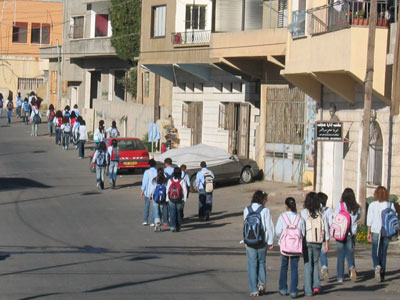 Egypt's Prime Minister Ahmed Nazif said yesterday a holiday for the Al-Adha Feast at the end of the current month will be extended to ten days after the spread of swine flu among schoolchildren
Egypt's Prime Minister Ahmed Nazif said yesterday a holiday for the Al-Adha Feast at the end of the current month will be extended to ten days after the spread of swine flu among schoolchildren
The holiday of the feast for schools and universities will be doubled as the A/H1N1 virus cases increased among schoolchildren," Nazif said.The Al-Adha Feast is scheduled to be on November 27, the tenth day of the twelfth month in the Muslim calendar. Egypt used to take a five-day holiday, including a day before the feast."As a preventive measure, schools will be closed for ten days starting on November 26 and ending on December 5," the official Middle East News Agency (MENA) quoted the Prime Minister as saying yesterday.About 98 Egyptian and non-Egyptian persons have tested positive for swine flu, also known as A/H1N1, bringing the total cases to 1,592 since the disease was detected last summer, an official statement by the Ministry of Health said yesterday.It said that new cases included 65 pupils/students attending schools in the Greater Cairo Area, where they had contact with infected persons. The area includes the governorates of Cairo, Qaliubia, Giza, Helwan, and the 6th of October.The statement added that laboratory tests found out that 30 Egyptians had contracted the A/H1N1 virus after visiting Saudi Arabia and Italy. "The patients, who arrived in Egypt late Friday, were transferred to a hospital in Cairo," it said.The Ministry has also reported that three Russian tourists, who have tested positive for swine flu, are still in hospital receiving treatment, the statement added."All patients are in a stable condition. They will be discharged soon after completing their anti-viral medication," the statement said.Meanwhile, around 1,200 Egyptians left on Friday for the holy cities of Mecca and Madina after taking swine flu vaccinations according to instructions and conditions of the Saudi Health Ministry, officials at the Suez seaport said. Pilgrims travelling by air are set to fly to Saudi Arabia today. Egypt has reported six swine flu-related deaths since last April.As the deaths increased, fears of contracting the deadly virus further mounted among Egyptian parents, who began to prevent their children from attending classes. Five Egyptians, including a 9-year-old pupil, died of the A/H1N1 virus since its outbreak in the most populous Arab country earlier in May. Up till now, the Ministry of Health reported more than 1,500 cases of the novel flu, including more than 200 schoolchildren. Egypt reported its first A/H1N1 flu case on June 2, a 12-year-old Egyptian-American girl coming from the United States via Amsterdam, the Netherlands.



